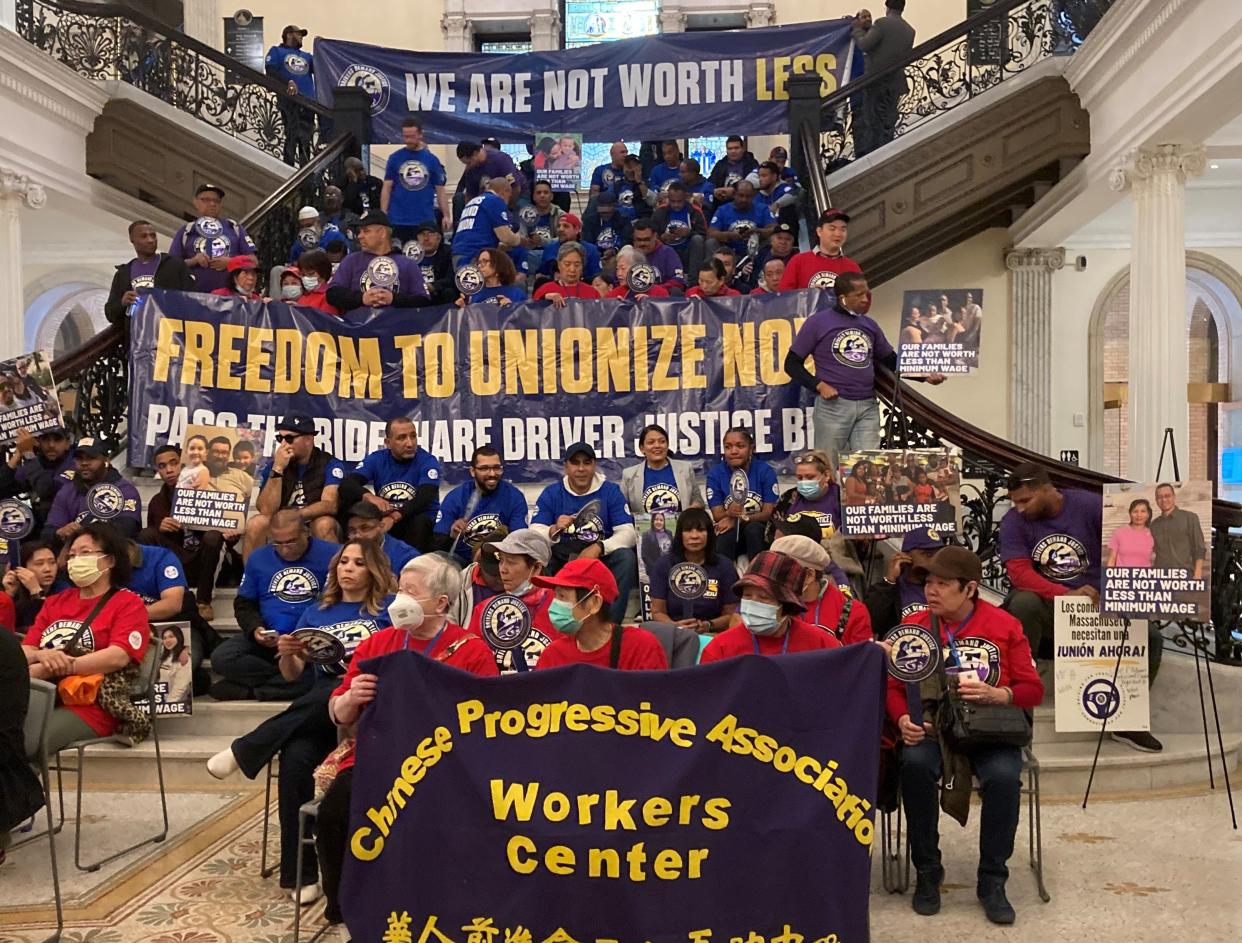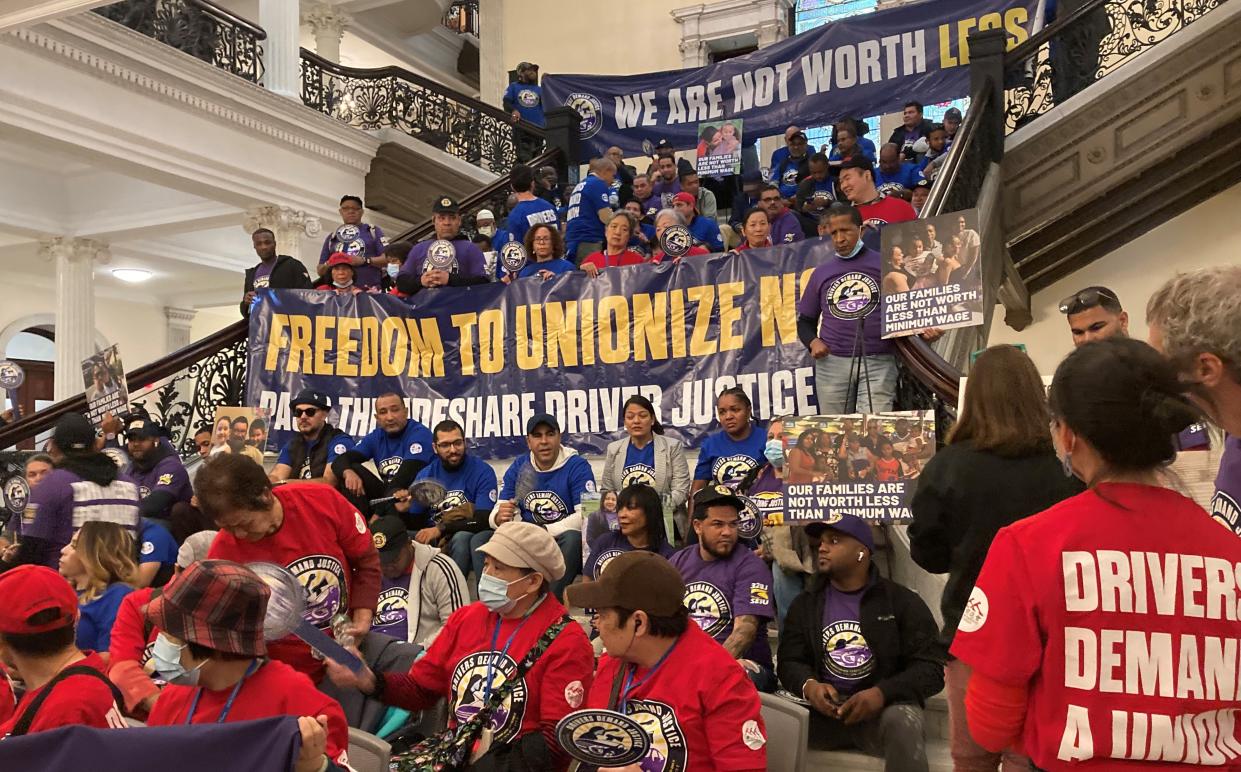Battling Mass. ballot questions classifying gig-drivers could be resolved with legislation
BOSTON - With a little more than a year to go before Massachusetts voters are asked to weigh in on a slew of ballot questions, campaigns for some are already heating up.

In Massachusetts, state Attorney General Andrea Campbell is responsible for reviewing applications for ballot questions and constitutional amendments. These are all voted on in even-year election cycles. The AG’s office approved 54 petitions for the 2024 and 2026 election cycles — 49 seeking new laws to be decided in 2024, and five seeking changes to the state’s constitution, which will be included on 2026 ballots.
Rep. Michael Connolly, D-Cambridge, is recruiting volunteers to gather signatures for his petition to lift the ban on rent control, imposed statewide through a 1994 ballot initiative. If voters decide in favor of replacing the ban with the Tenant Protection Act, it would grant power to municipalities to enact local protections for tenants, including rent control or stabilization, just-cause eviction protection and other associated measures.
Just as hot is the campaign to determine how Massachusetts classifies app-based drivers: Are they to be considered employees of the applications like Lyft, Uber, DoorDash and Instacart, or will they remain classified as independent contractors?
The question matters. Almost 200,000 app-based drivers are working in the Bay State. If they remain classified as independent contractors, they lose out on benefits like earning overtime, paid time off, health benefits, workers' compensation for job-related injuries and unemployment insurance.
It also matters to the state’s coffers. Independent contractors do not contribute to the state’s unemployment insurance fund; employers with employees do. The state auditor’s office is reviewing the effect on the fund and the state budget if drivers continue to be classified as independent contractors.
According to State Auditor Diana DiZoglio’s office, “the report is currently in the research phase. Once our office has completed the report it will be made public.”
A similar deep dive into state finances in New Jersey by the state's attorney general resulted in a payment of $100 million to the state by Uber in past-due contributions.
Former Attorney General Maura Healey filed suit against Uber Technologies and Lyft in 2020 alleging the companies misclassified their drivers as independent contractors, not employees, and by doing so denied drivers wage and related benefits as required by state law. That lawsuit is poised to start in spring 2024.
A cursory look through campaign material filed with the state’s Office of Campaign and Political Finance revealed that those advocating for drivers to remain independent have yet to file their first financial reports. The Coalition for Independent Work has been very active in the campaign and were the drivers of a similar effort that was nixed before reaching the ballot in 2022.
False start for initiative
That initiative was victim of a false start. The question was dropped from statewide ballots when the Massachusetts Supreme Judicial Court ruled it ineligible because of language that “violated the related subjects requirement; they presented voters with two distinct policy decisions.”
Campaign finance reports indicated that app-based companies had made healthy contributions to the campaign, donating more than $35 million.
This year, the group advocating to keep drivers independent has filed nine versions of the question to ensure the language is correct. Included in some versions is a minimum wage of $18 paid during engaged time, and the possibility of earned paid time off and options for health care benefits. The group advocating for unionization released a report countering some of the claims made by the tech companies.
A second petition, with just one version, was filed with the Attorney General’s Office by Drivers Demand Justice Coalition. The question asks whether Massachusetts should allow rideshare drivers to unionize and bargain collectively for rights and benefits.

Rep. Frank Moran, D-Lawrence, and Sen. Jason Lewis, D-Winchester, have filed companion bills that would create a pathway for drivers to form a union.
At a recent legislative hearing before the Joint Committee on Labor and Workforce Development, Steve Tolman, the former president of the Massachusetts AFL-CIO, told lawmakers that classifying rideshare workers as independent contractors was “a systematic dismantling of the Massachusetts workplace economy.”
In her remarks to the Committee, Sally Dworak-Fisher, with the National Employment Law Project, told legislators that maintaining the status quo of classifying drivers as independent contractors would “enshrine a lower class of workers in Massachusetts,” adding it would create a permanent second-class status of workers: gig-workers.
In classifying workers as independent contractors, Dworak-Fisher said the companies avoid making certain payments to the state, including certain taxes and avoid contributing to social insurance programs, which weakens Massachusetts’ state safety net for all employees.
“It is possible for rideshare drivers to maintain flexibility (in work schedules) without exploitation and being in control of their schedules,” Dworak-Fisher said.
In its literature, the Coalition for Independent Work points to the issue of flexibility as key for drivers. Of drivers surveyed, 92% have indicated that being in control of their schedules is why they work as drivers. The majority of women drivers have said that flexibility is key.
This article originally appeared on Telegram & Gazette: No ballot questions this election cycle; but AG approved 49 for 2024
